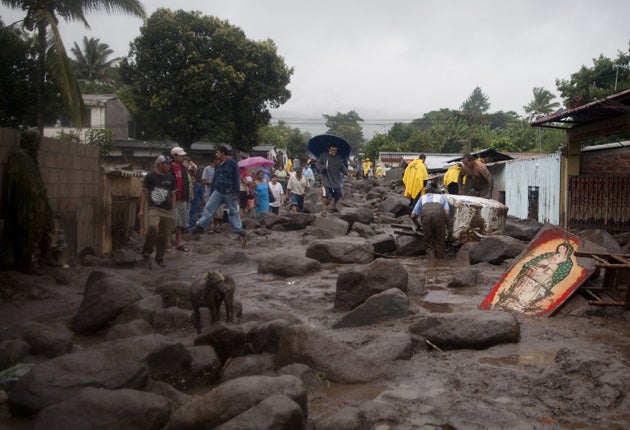Frantic search for survivors begins after El Salvador floods
130 dead and 7,000 living in shelters as storm heads towards US coast

Your support helps us to tell the story
From reproductive rights to climate change to Big Tech, The Independent is on the ground when the story is developing. Whether it's investigating the financials of Elon Musk's pro-Trump PAC or producing our latest documentary, 'The A Word', which shines a light on the American women fighting for reproductive rights, we know how important it is to parse out the facts from the messaging.
At such a critical moment in US history, we need reporters on the ground. Your donation allows us to keep sending journalists to speak to both sides of the story.
The Independent is trusted by Americans across the entire political spectrum. And unlike many other quality news outlets, we choose not to lock Americans out of our reporting and analysis with paywalls. We believe quality journalism should be available to everyone, paid for by those who can afford it.
Your support makes all the difference.El Salvador was beginning a vast recovery operation yesterday as the death toll from mudslides and flooding driven by Hurricane Ida continued to climb.
Some 124 people are now confirmed dead, with another 60 missing in the disaster, which struck most severely about 30 miles from the capital of San Salvador. Soldiers and emergency workers swarmed the town of Verapaz yesterday, searching for survivors in areas that were buried by the onslaught of mud and boulders from the slopes of the nearby Chichontepec volcano.
President Mauricio Funes called the storm a "tragedy" that had caused "incalculable" damage. "The images that we have seen today are of a devastated country," President Funes said in a televised address. He declared a state of emergency. Seven thousand people are living in shelters as a result of the disaster.
Ida, only the third hurricane of the year, was churning through the Gulf of Mexico towards the US last night, but US authorities said that it had now weakened to a tropical storm, with winds of up to 110mph. Residents in some coastal communities were urged to evacuate their homes as the National Hurricane Centre warned of "large and destructive" waves.
Landfall in the US was expected overnight or early this morning. Forecasters said that that the greatest danger would come from heavy rainfall.
But in Verapez the damage was severe. Bodies wrapped in muddy sheets were being taken to a local chapel yesterday, as survivors spoke of the speed with which the mudslide struck their homes. "It was about two in the morning when the rain started coming down harder and the earth started shaking," recalled Matias Mendoza, 26, who was in his house with his wife and one-year-old son during the storm.
"I warned my wife and grabbed my son, and all of a sudden we heard a sound. The next thing I knew I was lying among parts of the walls of my house," he added. "A few minutes later, I found my wife and my son in the middle of the rubble, and, thank God, we're alive."
Cruz Ayala, another survivor in the town, described the slide as "something black, like a huge wave, a huge noise, and I heard screams of people asking for help". Her 71-year-old mother and one niece also escaped death, but another of Ms Ayala's nieces was still missing last night.
The rains in El Salvador were from a Pacific system that may have been drawn eastwards into the central American country by the presence of Hurricane Ida in the western Caribbean. Late on Sunday, Ida skirted just east of the Mexican resort city of Cancun and began its journey through the Gulf of Mexico, causing some oil companies to evacuate off-shore drilling rigs.
In Louisiana, where 1,400 families are still living in mobile homes provided in the wake of Hurricane Katrina, the Governor, Bobby Jindal, declared a state of emergency at the weekend ahead of Ida's arrival. It seemed unlikely that the storm would have any direct impact on New Orleans, however, which suffered the brunt of Katrina.
Weather warnings were in effect, though, for areas stretching all the way from the southeastern end of Louisiana along the shores of Mississippi and Alabama and into the panhandle of Florida. It is thought Ida could cause up to 200mm of rain in some areas there.
Join our commenting forum
Join thought-provoking conversations, follow other Independent readers and see their replies
Comments